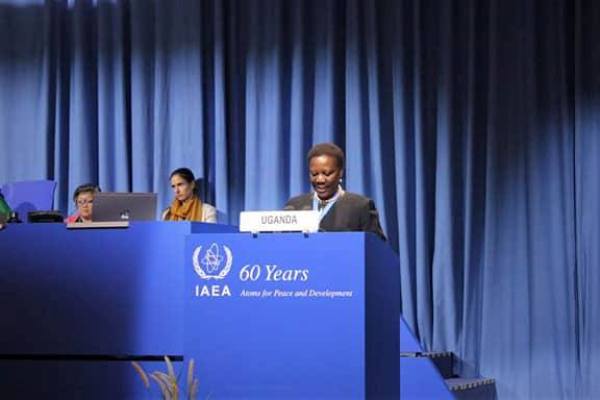The Minister of Energy and Mineral Development Eng. Irene Muloni has applauded the International Atomic Energy Agency (IAEA) for supporting and facilitating Uganda’s efforts in the peaceful use of Nuclear Energy for sustainable growth and development.
Eng.Muloni led the Ugandan Delegation to the the 61st Regular Session of the IAEA General Conference held at Vienna International Centre, Vienna – Austria from September 18TH – 22ND, 2017.
The Alternate Head of delegation was Ambassador Marcel Tibaleka, the Resident Representative to the IAEA / Head of Mission, Embassy of the Republic of Uganda – Berlin.
The conference attracted participation of key Atomic Energy Sub-Sector players such as Natural Resources Committee of Parliament, Ministry of Agriculture, Animal Industry and Fisheries; Ministry of Defense; Ministry of Energy and Mineral Development; Ministry of Internal Affairs. Government agencies included; Atomic Energy Council; National Crops Resources Research Institute (NaCRRI); National Planning Authority (NPA); Uganda Cancer Institute and Uganda National Bureau of Standards (UNBS).
In her address to the conference, Muloni appreciated the Agency for its untiring efforts in helping Member States use nuclear science and technology to facilitate, among others; food security, sustainable agriculture, human health, sustainable energy development and water resources management.
The assistance received over the past 50 years of cooperation with the IAEA has been in form of human resources development and acquisition of specialized equipment across the various sectors of Government.
“The cooperation with the Agency in the areas of peaceful use of nuclear science and technology will greatly facilitate the realization of the Sustainable Development Goals (SGGs). This will in turn help our country achieve its dream of becoming a Middle Income Country”, said Eng. Muloni.
She also added that the country was pursuing plans to generate electricity using Nuclear Energy as one of the Uganda’s National Development Goals.
“In line with national development agenda, the Government of Uganda continues to prepare for the introduction of nuclear power as part of the diversification strategy for meeting future electricity needs for social economic development. My Government applauds the Agency for its contribution towards the Prefeasibility Studies for Launching the First Nuclear Power Plant in Uganda”, said Muloni.
At the margins of the conference, Hon. Eng. Irene Muloni, Minister of Energy and Mineral Development had a bilateral meeting with Ambassador Yukiya Amano the IAEA Director General.
The meeting focused on strengthening partnership in cancer management, nuclear power infrastructure development, tsetse flies control using nuclear techniques, and enhancing food safety to promote exportation of agricultural products, among others.
The Minister applauded the IAEA for the prompt response and continuous support towards the restoration of radiotherapy services in Uganda. The support includes facilitating the procurement and installation of the new Cobalt-60 machine at Uganda Cancer Institute.
The Minister also thanked IAEA for their support towards strengthening the national nuclear safety, security and safeguards regimes.
Uganda recently assumed the chair of the African Regional Co-operative Agreement for Research, Development and Training Related to Nuclear Science and Technology (AFRA) that was held here in Kampala.
Dr. Abel Rwendeire, Chairperson AFRA in his address to the meeting noted that significant achievements have been realize since the inception of the Agreement in areas such as; Human Health, Food and Agriculture, Water Resources, Sustainable Energy Development, Industrialization and the nuclear Technology applications, Radioactive waste management, and Education and Training. He noted that it is timely for AFRA to take stock of the impact of interventions to the socio economic wellbeing of the African region.





